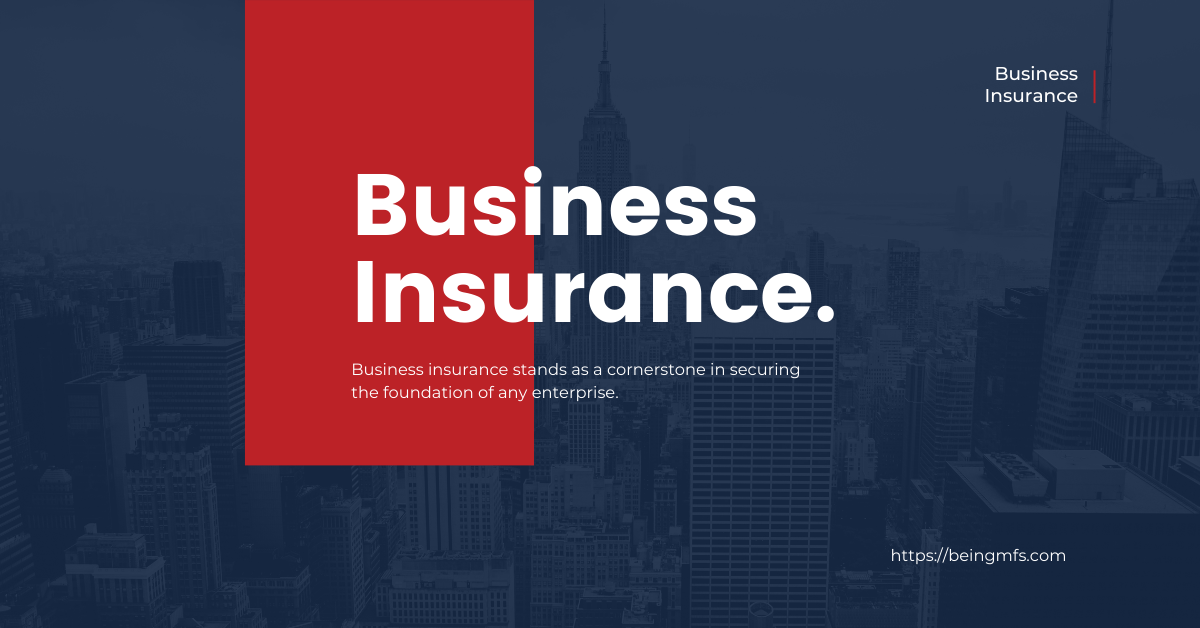Introduction
Table of Contents
Business insurance stands as a cornerstone in securing the foundation of any enterprise. In this comprehensive guide, we’ll delve into the intricacies of BI, from its various types to the nuances of choosing the right coverage.
Definition of Business Insurance
Commercial insurance, often known as business insurance, serves as a safety net for enterprises, protecting them against unforeseen losses and hazards. It includes a variety of regulations intended to guard against various threats and maintain a company’s stability and continuity.
Importance of It
The unpredictable nature of the business world makes insurance an indispensable asset. Whether you’re a small startup or a multinational corporation, having the right insurance coverage can mean the difference between overcoming facing financial ruin.
Types of Business Insurance
General Liability Insurance
General liability insurance covers bodily injury, property damage, and legal fees arising from accidents on your business premises or due to your products/services.
Property Insurance
Property insurance safeguards your business assets, including buildings, equipment, and inventory, against damage or loss caused by covered perils like fire, theft, or natural disasters.
Workers’ Compensation Insurance
Workers’ compensation insurance provides coverage for medical expenses and lost wages in case an employee is injured or becomes ill due to work-related activities.
Business Interruption Insurance
Business interruption coverage helps mitigate the financial impact of unexpected events that disrupt normal business operations, such as natural disasters or equipment breakdowns.
Professional Liability Insurance
Professional liability insurance, also known as errors and omissions insurance, protects businesses and professionals against claims of negligence or inadequate services.

Choosing the Right Business Insurance
Assessing Business Needs
Determining the right Security starts with a thorough assessment of your business needs. Identify potential risks and vulnerabilities specific to your industry.
Understanding Policy Coverage
Carefully review policy coverage to ensure it aligns with your business requirements. Different policies cater to different risks, so customization is key.
Comparing Insurance Providers
Don’t settle for the first quote you receive. Compare offerings from different insurance providers, considering reputation, customer reviews, and overall value.
Cost Factors and Budgeting
Factors Influencing Insurance Costs
Several factors impact Protection costs, including business size, industry, location, and coverage limits. Understand these factors to estimate your insurance budget accurately.
Tips for Budgeting BI
Budgeting for insurance requires balancing coverage and costs. Allocate resources based on your risk tolerance and financial capabilities, ensuring comprehensive protection without unnecessary expenses.
Common Mistakes to Avoid
Underestimating Coverage Needs
Avoid the pitfall of underestimating coverage needs. Assess potential risks meticulously and ensure your policy adequately addresses them.
Ignoring Industry-Specific Risks
Different industries face unique risks. Don’t ignore industry-specific risks; tailor your insurance coverage to address challenges specific to your business sector.
Neglecting Policy Reviews
Business dynamics evolve, and so should your insurance policy. Regularly review your coverage to ensure it remains relevant and effective in the face of changing circumstances.
Case Studies
Real-life Examples of Business Insurance Benefits
Explore real-life case studies where businesses benefited from having the right insurance coverage. These success stories highlight the tangible advantages of proactive risk management.
Future Trends in Business Insurance
Technological Innovations
Stay ahead of the curve by exploring emerging technological trends in business insurance. From AI-driven risk assessments to blockchain-enabled claims processing, the future holds exciting possibilities.
Evolving Risks and Coverage
As the business landscape evolves, so do risks. Stay informed about evolving risks and ensure your insurance coverage adapts to meet new challenges.
The Claims Process
Step-by-Step Guide
Navigating the claims process can be daunting. This section provides a step-by-step guide on how to file a business insurance claim, ensuring a smooth and efficient resolution.
Common Pitfalls to Avoid
Learn from the experiences of others. This section highlights common pitfalls businesses encounter during the claims process and provides insights on avoiding them.
Industry Regulations
Compliance Requirements
Understanding and adhering to industry regulations is crucial for ensuring your business insurance remains valid and effective. Stay informed about compliance requirements relevant to your industry.
Changes and Updates
Regulations evolve, and so should your compliance efforts. Regularly update your knowledge of industry regulations to maintain a proactive approach to risk management.
Expert Advice and Tips
Insights from Industry Professionals
Gain valuable insights from industry professionals who share their expertise on navigating the complexities of business insurance. Learn from their experiences and apply proactive measures to mitigate risks.
Proactive Measures for Risk Mitigation
Prevention is better than cure. Discover proactive measures to mitigate risks, ranging from employee training programs to implementing robust security measures.
Success Stories
Businesses Thriving Due to Adequate Insurance
Explore inspiring stories of businesses that not only survived unforeseen challenges but thrived due to their strategic approach to commercial insurance.
Lessons Learned from Adversity
Learn valuable lessons from businesses that faced adversity. Their experiences shed light on the importance of resilience and strategic risk management.
Conclusion
In the ever-evolving landscape of business, insurance stands as a pillar of stability. By understanding the nuances of different policies, proactively managing risks, and staying abreast of industry trends, businesses can navigate uncertainties with confidence. Business insurance is not just a financial investment; it’s a strategic move towards safeguarding your ventures.
Frequently Asked Questions (FAQs)
Which topics are covered by company insurance?
BI covers a range of risks, including liability, property damage, and employee-related issues. It provides financial protection against unforeseen events that could otherwise jeopardize your business.
How much commercial insurance do I need?
The amount of BI needed depends on factors like Company size, industry, and risk tolerance. A thorough assessment of potential risks will help determine the appropriate coverage.
Can I bundle different types of BI?
Yes, many insurance providers offer bundled packages that combine different types of coverage for a more comprehensive protection plan. Bundling can also lead to cost savings.
How do I file a business insurance claim?
Filing a commercial insurance claim involves notifying your insurance provider promptly, providing necessary documentation, and cooperating with the claims adjuster. A step-by-step guide ensures a smooth process.
Exist any tax advantages connected to company insurance?
In some cases, business insurance premiums may be tax-deductible. Consult with a tax professional to understand the specific tax benefits applicable to your commercial insurance.

Blogger | SEO Expert | Social Media Marketer
👩💻 Hi there! I’m Farhan Ansari, a passionate blogger on a mission to share my thoughts and insights with the world. 🌍✨
📚 I’m a lifelong learner, constantly exploring new ideas and experiences. Join me as I dive into various topics, from tech trends and travel adventures to personal development and beyond.
🤝 Let’s connect, learn, and grow together. Don’t hesitate to drop a comment or reach out—I love engaging with my readers!
🌟 Thanks for stopping by, and welcome to my blog journey. 📝💕
